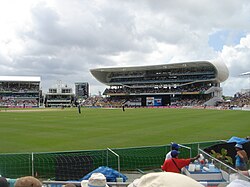England
England were placed in Group D with West Indies and Ireland after having made some team selections that had sparked discussion. Among those were Durham all-rounder and two-time Ashes winner Paul Collingwood being named T20 captain over Test and ODI captain Andrew Strauss, while Test and ODI attack leader James Anderson was in the T20 squad, but largely preferred to swing specialist Ryan Sidebottom. Another decision that became especially controversial was the inclusion of two naturalized South Africans as opening batsmen – Michael Lumb and wicketkeeper Craig Kieswetter – in addition to star batsman Kevin Pietersen, born in South Africa but with an English mother. The team also included Eoin Morgan – who, on a previous tour of the West Indies, had been in the Irish team that had upset Pakistan and Bangladesh during the 2007 World Cup and also eventually captained England's 2019 World Cup triumph on home soil. Two other Ashes-winning bowlers were also included in fast bowler Stuart Broad and off-spinner Graeme Swann.
They began the tournament in disappointing fashion with a defeat to hosts West Indies by 8 wickets on the D/L method. In the next match against Ireland, England batted first and scored 120/8 in their 20 overs. Rain reduced Ireland's innings to 3.3 overs, causing the match to be abandoned. This meant England qualified for the Super 8's with a higher net run rate. In the Super 8s, they found their form and won each of their matches, defeating Pakistan, New Zealand and South Africa to top Group E. In the semifinal against Sri Lanka, Pietersen's unbeaten 42 from 26 following a 2–21 from man of the match Broad helped secure a seven-wicket victory.
Australia
Having reached the semifinals of the first World T20 and won the previous three World Cups, Australia started the tournament as one of the favorites. They fielded a team that included future World Cup-winning captain Michael Clarke as T20 skipper after Test and ODI captain Ricky Ponting had withdrawn from Australia's T20 side, and he was backed up by players who had won Ashes series, World Cups or both, including batsman Michael Hussey (joined by brother David in the team), fast bowler Shaun Tait, all-rounder Shane Watson and Steve Smith, who was still a leg-spinning all-rounder at the time instead of a specialist batsman. Pacer Dirk Nannes was also in the team, having become an Australian citizen after helping his native Netherlands shock England at Lord's during the previous World T20. Stalwart fast bowler Brett Lee had also been named in the squad but was unable to participate.
They won Group A after beating both Bangladesh and defending champion Pakistan, and in the Super 8s, they comfortably defeated India, Sri Lanka and the West Indies to progress to the semifinals for a rematch with Pakistan. Pakistan batted first and posted a challenging total of 191. The Australian top order had no mercy for the Pakistani bowlers, but the match looked to be in the defending champions' hands, as Australia needed 51 runs off the last three overs, and were still 18 runs short, with the final over coming up against touted off-spinner Saeed Ajmal, a member of Pakistan's 2009 World T20 champions. Mike Hussey rose to the occasion, however, hitting three sixes and a four to get Australia to the target for a three-wicket victory with a ball to spare. Man of the match Hussey finished on 60 not out from 24 balls, having hit the most final over runs to complete a T20 international chase (his 22 was not surpassed until the West Indies' Carlos Brathwaite scored 24 off four consecutive sixes with 19 required against England's Ben Stokes to win the 2016 final.)
